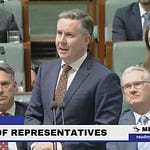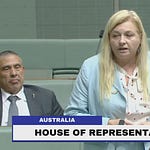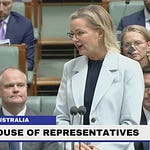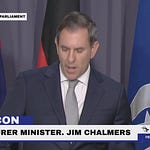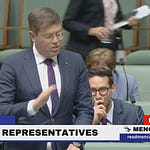Thank you to everyone who tuned into my live video! Join me for my next live video in the app.
Episode Summary
This episode features Dr. Tahani Mustafa, a Middle East expert from the European Council on Foreign Relations, discussing the recently ratified Israel-Hamas ceasefire agreement. Dr. Mustafa explains why she believes this deal follows a familiar pattern of previous failed agreements, with ambiguous language that gives Israel significant leeway and lacks serious guarantees for enforcement. She breaks down the practical challenges Hamas faces in locating all hostages, the limited pressure from regional Arab states despite public posturing, and the proposed technocratic governance structure for Gaza. The conversation also explores how the ceasefire might impact the West Bank, where Israel has accelerated land seizures and arrests, and examines the controversial international involvement, including Trump’s 200 U.S. soldiers and Tony Blair’s potential role. Throughout the discussion, Dr. Mustafa emphasizes that the deal offers little benefit to Palestinians while serving Israel’s public relations interests and regional states’ self-preservation goals.
Five Important Bullet Points
Ceasefire follows familiar failure pattern: The agreement contains the same ambiguous language and unresolved sticking points as previous ceasefires, with no substantial guarantees that Israel will act in good faith or face consequences for violations
Hostage situation reveals operational realities: Hamas’s difficulty locating all hostages stems from practical constraints—multiple factions took hostages on October 7th, and ongoing bombardment makes coordination impossible, not from lack of organizational control
Proposed governance structure is inherently political: The technocratic council for Gaza would answer to international brokers rather than Palestinians, effectively separating Gaza from the West Bank and preventing a contiguous Palestinian state while giving Israel and Western allies power to select representatives
Regional Arab states acting from self-interest, not principle: Despite public support for the deal, no Arab state has leveraged normalization agreements, recalled ambassadors, or severed economic ties with Israel—they’re motivated by existential threats to their own borders and domestic stability concerns
West Bank bears the cost of Gaza reprieve: While attention focuses on Gaza, Israel has conducted the largest land grab since Oslo Accords, displaced thousands through operations like “Iron Wall,” and arrested over 10,000 Palestinians in the West Bank since October 7th, 2023
Detailed Synopsis
The episode opens with host Mikko Santos introducing Dr. Tahani Mustafa to discuss the Israel-Hamas ceasefire agreement that Israel’s cabinet has ratified. Dr. Mustafa, a visiting fellow specializing in Middle East security and governance, immediately establishes her skeptical assessment: this agreement represents a familiar pattern rather than a genuine breakthrough.
Assessment of the Agreement’s Viability
Dr. Mustafa identifies multiple structural weaknesses in the deal. The negotiation process has left critical sticking points unresolved or deliberately ambiguous, creating loopholes Israel can exploit to justify returning to open warfare—a pattern seen in previous ceasefires. The agreement lacks enforcement mechanisms or serious guarantees, particularly regarding Israeli withdrawal, hostage handover procedures, and long-term governance questions including Hamas’s disarmament.
A critical vulnerability is the compressed timeline for phase one. Hamas must hand over all hostages within days, after which Israel could collapse the agreement once it achieves its primary objective without facing meaningful consequences. Historical precedent shows Israel has re-arrested released Palestinian prisoners and compensated for releases through mass arrest campaigns, particularly in the West Bank, where over 10,000 arrests have occurred since October 7th, 2023.
Hamas’s Position and Capabilities
Addressing reports that Hamas cannot locate all hostages, Dr. Mustafa provides crucial context: multiple factions breached the barrier on October 7th and took hostages, not just Hamas. The ongoing bombardment by land, air, and sea makes coordination practically impossible. This reflects operational constraints rather than organizational breakdown. Dr. Mustafa notes that Hamas has been “strong-armed” into accepting unfavorable terms through pressure from both regional states and a U.S. ultimatum: face annihilation or accept a compromised deal.
She reveals that Hamas now understands the hostages haven’t provided the leverage they anticipated—if anything, they’ve enabled Israel to justify its actions in Gaza.
International and Regional Guarantees
Dr. Mustafa systematically dismantles the notion of meaningful international pressure. No regional state has leveraged their normalization or peace deals with Israel, recalled ambassadors, or severed economic-security-political ties. Behind closed doors, states like the UAE and Saudi Arabia contradict their public red lines on issues like annexation.
The European Union, Israel’s largest trading partner, hasn’t considered even partial suspension of trade agreements despite two years of conflict. When Israel broke the January 2025 ceasefire and used starvation as a weapon, the EU issued a statement blaming Hamas. The U.S., under Trump, has made explicit that any ceasefire pursuit serves his personal ambitions (Nobel Peace Prize pursuit) rather than humanitarian concerns—interest that may wane now that this goal appears unattainable.
Governance Proposals for Gaza
The proposed technocratic council represents what Dr. Mustafa calls “an inherently political project” disguised as depoliticized governance. This body would answer to international brokers—the U.S., Europeans, and ultimately Israel—rather than Palestinians. Its composition would be selected by figures like Trump and Netanyahu, not by Palestinians themselves.
This structure would provide minimal services (education, sanitation, health) while focusing security efforts on disarming Palestinians rather than protecting them. It would formalize the separation of Gaza from the West Bank, making a contiguous Palestinian state impossible. Israel has repeatedly objected to any governance structure—whether technocratic, Palestinian Authority-led, or Hamas-involved—that might allow Gaza to pose any threat to Israeli security.
Arab State Motivations
Dr. Mustafa argues the regional “realignment” reflects self-interest rather than genuine concern for Palestinians. The deal offers nothing beneficial to Palestinians: no guarantee of full Israeli withdrawal, no assurance of independent statehood, no Palestinian control over representative selection, and it demands disarmament of organized resistance.
Arab states face their own crises: Jordan, Syria, and Lebanon confront existential threats as Netanyahu openly pursues territorial expansion into their borders. Domestically, these regimes have spent two years suppressing Palestine-related activism, making prisons “revolving doors” even for those involved only in charity work. Gulf states like Qatar have seen sovereignty violations, while Saudi Arabia’s normalization ambitions have been derailed. All seek stabilization to address domestic legitimacy challenges and prevent regional war.
Impact on the West Bank
Gaza’s distraction has served Israel’s West Bank objectives perfectly. The territory has experienced the largest land grab since the Oslo Accords, the largest displacement since the 1967 war when Israel annexed the West Bank from Jordan, and some of the highest fatalities since the Second Intifada.
Operation Iron Wall in January exemplified the cost: one of the most lethal military operations in recent West Bank history, displacing 40,000 people through indiscriminate killing and fulfilling far-right Israeli ministers’ promises to create “mini-Gazas” in West Bank localities. Israel justified this as targeting armed resistance, but Dr. Mustafa contextualizes why younger Palestinians have turned to arms after generations had renounced violence. Even when the Palestinian Authority brokered amnesty deals—militants in prison in exchange for laying down arms—Israel rejected this, preferring, in the words of a Western military official working with both the IDF and PA, to see militants “dead” rather than imprisoned.
International Involvement: Trump and Tony Blair
Trump’s announcement of bringing 200 U.S. soldiers and proposing a “Council of Peace” draws sharp criticism. Dr. Mustafa emphasizes the U.S. is not a neutral arbiter and has been “the biggest impediment” to international monitoring efforts. Two hundred soldiers don’t constitute a genuine international observer force.
The Council of Peace concept evokes comparisons to the mandate system—”refashioned modern-day colonialism.” Most controversially, it may assume diplomatic duties on behalf of Palestinians despite the PLO’s status as the internationally recognized legal representative of all Palestinians globally.
Tony Blair’s potential involvement particularly concerns Dr. Mustafa. As quartet head, Blair enforced an international embargo against a democratically elected Palestinian government—the first opposition party to become government in the region’s history. States involved later regretted this action, realizing it produced the opposite of intended results and created the current predicament. Blair’s technocratic decisions included diverting education funds to build prisons for “anticipated prisoners” after the Second Intifada—hardly the competence needed for effective Gaza governance.
Warning Signs and Collapse Indicators
Asked about potential spoilers, Dr. Mustafa redirects focus: “It’s not so much about spoiler groups, more like spoiler states.” Israel has torpedoed previous ceasefire talks at every turn and latched onto any pretext to break agreements unilaterally, facing no serious international pressure.
The January 2025 ceasefire provides instructive precedent. Israel struggled to find legitimate excuses during phase one as Hamas committed no serious violations, while Israel committed 962 violations and redrew withdrawal borders. Israel only broke the agreement once entering phase two.
The critical watch point: Monday’s deadline when Hamas must hand over all remaining hostages. What happens after Israel achieves its primary objective will determine the agreement’s fate.
What Readers Will Learn
Listeners and readers engaging with this content will gain:
Critical framework for analyzing Middle East peace agreements: Understanding how ambiguous language, lack of enforcement mechanisms, and asymmetric power dynamics typically doom ceasefire agreements to failure
Geopolitical reality behind public statements: Recognition that regional Arab states’ public posturing differs dramatically from their private actions and motivations, with self-preservation driving policy rather than Palestinian welfare
Historical context for current Palestinian resistance: Why younger West Bank Palestinians have turned to armed resistance after generations renounced violence, and how Israeli policies have systematically foreclosed peaceful alternatives
Governance challenges in occupied territories: The fundamental difference between technical governance solutions and political realities, including how international technocratic structures can formalize occupation rather than ending it
Pattern recognition for predicting conflict trajectories: Specific indicators to watch for ceasefire collapse, including hostage handover timing, Israeli actions in the West Bank, and international response to violations
West Bank dynamics during Gaza crises: How international attention on Gaza enables accelerated Israeli land seizures, displacement campaigns, and mass arrests in the West Bank—the territory where Israel’s long-term territorial ambitions actually lie
Role of international actors in perpetuating conflict: Understanding how U.S., European, and other international involvement often serves as cover for maintaining status quo rather than achieving genuine resolution







